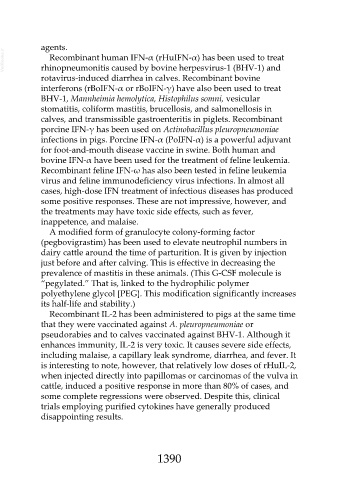Page 1390 - Veterinary Immunology, 10th Edition
P. 1390
agents.
VetBooks.ir rhinopneumonitis caused by bovine herpesvirus-1 (BHV-1) and
Recombinant human IFN-α (rHuIFN-α) has been used to treat
rotavirus-induced diarrhea in calves. Recombinant bovine
interferons (rBoIFN-α or rBoIFN-γ) have also been used to treat
BHV-1, Mannheimia hemolytica, Histophilus somni, vesicular
stomatitis, coliform mastitis, brucellosis, and salmonellosis in
calves, and transmissible gastroenteritis in piglets. Recombinant
porcine IFN-γ has been used on Actinobacillus pleuropneumoniae
infections in pigs. Porcine IFN-α (PoIFN-α) is a powerful adjuvant
for foot-and-mouth disease vaccine in swine. Both human and
bovine IFN-α have been used for the treatment of feline leukemia.
Recombinant feline IFN-ω has also been tested in feline leukemia
virus and feline immunodeficiency virus infections. In almost all
cases, high-dose IFN treatment of infectious diseases has produced
some positive responses. These are not impressive, however, and
the treatments may have toxic side effects, such as fever,
inappetence, and malaise.
A modified form of granulocyte colony-forming factor
(pegbovigrastim) has been used to elevate neutrophil numbers in
dairy cattle around the time of parturition. It is given by injection
just before and after calving. This is effective in decreasing the
prevalence of mastitis in these animals. (This G-CSF molecule is
“pegylated.” That is, linked to the hydrophilic polymer
polyethylene glycol [PEG]. This modification significantly increases
its half-life and stability.)
Recombinant IL-2 has been administered to pigs at the same time
that they were vaccinated against A. pleuropneumoniae or
pseudorabies and to calves vaccinated against BHV-1. Although it
enhances immunity, IL-2 is very toxic. It causes severe side effects,
including malaise, a capillary leak syndrome, diarrhea, and fever. It
is interesting to note, however, that relatively low doses of rHuIL-2,
when injected directly into papillomas or carcinomas of the vulva in
cattle, induced a positive response in more than 80% of cases, and
some complete regressions were observed. Despite this, clinical
trials employing purified cytokines have generally produced
disappointing results.
1390

